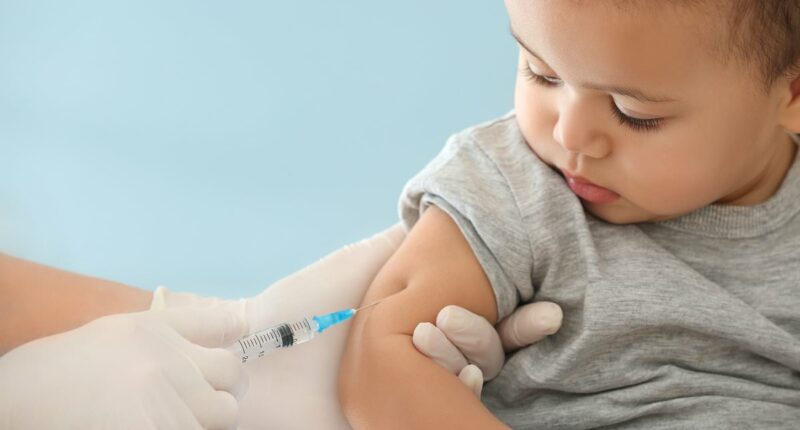Share this @internewscast.com
A major 20-year study of over one million children found no association between aluminum in vaccines and conditions like autism and ADHD.
Findings in the sweeping investigation provide a rebuttal to oft-debunked claims about the use of aluminum salts in vaccines, which bolster the body’s immune response, and purported ties to asthma, autoimmune diseases, and autism.
DANISH researchers looked at 50 potential health effects in children taking a vaccine containing aluminum salts, including 36 immune system disorders like diabetes and celiac disease, nine allergy-related conditions, such as asthma and eczema, and five neurodevelopmental disorders, including autism and ADHD.
They found no increased risk of autism, ADHD, asthma, or autoimmune disorders from the small amounts of aluminum in vaccines.
In fact, vaccinated children showed slightly lower rates of neurodevelopmental conditions – a seven percent lower autism risk and a 10 percent lower ADHD risk – with no connection to allergic or immune problems.
Aluminum adjuvants are safely used in several common childhood vaccines, including those protecting against diphtheria-tetanus-pertussis (DTaP/Tdap), hepatitis A and B, Haemophilus influenzae type b (Hib), and pneumococcal disease.
The aluminum in vaccines acts as a booster, strengthening the body’s immune response to the vaccine. The salts create a temporary irritation at the injection site, which helps the immune system recognize and remember the germ, allowing it to build long-lasting protection.
During a June 2024 appearance on Joe Rogan’s popular podcast, Kennedy falsely labeled aluminum as ‘extremely neurotoxic,’ mirroring the debunked rhetoric of the anti-vaccine group Children’s Health Defense, which ties aluminum adjuvants to autism, contradicting decades of rigorous studies confirming vaccine safety.

Aluminum adjuvants are safely used in several common childhood vaccines, including those protecting against diphtheria-tetanus-pertussis (DTaP/Tdap), hepatitis A and B, Haemophilus influenzae type b (Hib), and pneumococcal disease
Senior study author Dr Anders Hviid, an epidemiologist at the Statens Serum Institut in Denmark, said: ‘By analyzing data from more than one million Danish children, we found absolutely no indication that the very small amount of aluminum used in the childhood vaccination program increases the risk of 50 different health outcomes during childhood.’
‘This is the first study of this scale and with such comprehensive analyses, and it confirms the strong safety profile of the vaccines we’ve used for decades in Denmark.’
Since 1997, Denmark has offered, though not required, aluminum-containing vaccines for diseases including diphtheria, tetanus, whooping cough, and polio. Babies receive three doses by the age of one, with a booster dose at age five.
The study tracked aluminum exposure from these vaccines, which ranged from 0.125 mg to 1 mg per dose.
Using national health records, the team compared aluminum exposure levels to any of the 50 examined diagnoses between the ages of two and five. They accounted for factors like birth weight, family income and maternal health.
With data spanning 24 years and encompassing 1.2 million children, some of whom were followed until age eight, the research team utilized statistical models that controlled for real-world variables, including doctor visits and parental smoking.
‘We should not be concerned about aluminum used as an adjuvant in childhood vaccines. I think that’s the core message,’ Dr Hviid told Stat.
The results were published this week in the Annals of Internal Medicine.

During a June 2024 appearance on Joe Rogan’s popular podcast, Kennedy falsely labeled aluminum as ‘extremely neurotoxic,’ mirroring the debunked rhetoric of the anti-vaccine group Children’s Health Defense
The latest study was in response to a 2022 CDC report that found a possible link between aluminum used as an adjuvant in vaccines and allergies and asthma in children.
Experts at the time pointed out limitations in CDC’s methodology. It couldn’t distinguish between aluminum from vaccines and environmental sources, such as food or air pollution.
They also highlighted puzzling inconsistencies, such as one subgroup of vaccinated children showing no increased risk of asthma despite higher exposure to aluminum.
Children are exposed to aluminum in various ways, separate from childhood vaccines.
In their first six months, babies get roughly four milligrams of aluminum from vaccines, a minuscule amount. A milligram is one-thousandth of a gram, and a gram is the weight of one-fifth of a teaspoon of water.
At the same time, breastfed infants ingest about 10 milligrams, formula-fed babies 40 milligrams and those on soy formula 120 milligrams.
Israeli immunologist Dr Yehuda Shoenfeld is the central figure in the debate over the safety of aluminum salts in vaccines through his proposed 2011 Autoimmune/Inflammatory Syndrome Induced by Adjuvants (ASIA) hypothesis.
His published work suggests aluminum-based vaccine adjuvants may trigger autoimmune responses in genetically susceptible individuals, forming the theoretical foundation for many concerns about the safety of common childhood shots.
However, while vaccine skeptics frequently cite Shoenfeld’s papers and book on ASIA, the broader scientific community notes significant limitations.
His hypothesis relies primarily on case reports and lacks consistent epidemiological support. Large-scale population studies have failed to validate any causal link between aluminum adjuvants and autoimmune conditions.
The research comes as autism diagnoses have increased in the US to one in 31 children compared to one in 150 two decades ago.
While Kennedy claims this could be blamed on environmental toxins like food additives and pesticides, autism experts believe the increase is due to better diagnostic criteria and more awareness.













